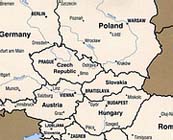Germany, Poland seek conciliation over European issues
 Bydgoszcz, Poland - Germany and Poland are moving toward closer policies on Eastern European and other issues, the two countries' foreign ministers said after talks on Monday in the Polish town of Bydgoszcz.
Bydgoszcz, Poland - Germany and Poland are moving toward closer policies on Eastern European and other issues, the two countries' foreign ministers said after talks on Monday in the Polish town of Bydgoszcz.
Polish Foreign Minister Radoslaw Sikorski said that in a meeting with visiting German colleague Frank-Walter Steinmeier the two sought to put aside contrary stances established between the two countries over the previous two years.
"There isn't a community of interests, but there are common interests," Sikorski said.
Sikorski also told journalists that differences of opinions exist in financial forecasts in relation to agricultural expenditures as well as others.
From a Polish perspective, EU policies concerning Eastern Europe play a very important role, Sikorski added, saying Poland wanted to emphasize this point during its EU presidency in 2011.
Poland wanted to inform the German side and work to come to a joint standpoint with Berlin, he said.
Steinmeier addressed press reports of a row between himself and Sikorski at the Bucharest NATO summit over the entry prospects of Ukraine.
Despite different assessments at the beginning, a common conclusion was found, Steinmeier said, adding that there are now assurance that the Ukraine is on its way to European-Atlantic structures.
Sikorski spoke of "honest discussion behind closed doors" after which the two returned to good relations.
Both politicians also stressed the necessity of dealing with the lack of knowledge of the traditions and history among their populations of each other's countries, and spoke of plans for a joint German-Polish history textbook for schools.
Sikorski welcomed Steinmeier's proposal for an exhibition in Berlin on Polish-German history in 2010 on the 40th anniversary of the visit by former German chancellor Willy Brandt to the memorial of the Warsaw ghetto uprising against the Nazis in 1943.
In the afternoon, both foreign ministers are to meet for discussions with students at Warsaw University and then with Polish Prime Minister Donald Tusk afterwards.
Under the nationalist-conservative government of Jaroslaw Kaczynski, a number of tensions arose between Warsaw and Berlin, including the Baltic Sea pipeline and historical grievances.
A thawing of relations occurred after the election in November of pro-European Tusk. Tusk and Sikorski visited Berlin in early December. (dpa)